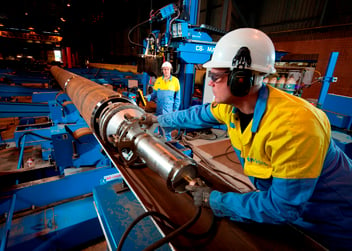Make sure you Qualify before you Diversify
 As your company prepares to diversify into an adjacent market of its current business—or, as it prepares to adapt existing products or services to enter a brand new market—be sure to take a long, hard look at your company’s organizational strengths and weaknesses.
As your company prepares to diversify into an adjacent market of its current business—or, as it prepares to adapt existing products or services to enter a brand new market—be sure to take a long, hard look at your company’s organizational strengths and weaknesses.
Here are several important questions to ask before you take that leap:
- How do you go to market right now?
- What are the expectations of your new market as to how you reach them?
- What is your current manufacturing capacity?
- If you hit a home run in your new market will you be able to keep up with the additional volume?
- Do you have a robust and effective Quality Management System in place now?
The answers to these questions, especially the last one, may well be critical to your success in a new market.
Look carefully before you leap
Recently, an Ohio manufacturer saw an opportunity to diversify its customer base by expanding from its traditional industrial users to specialty users. The company’s managers carefully researched the new target market. After identifying the key players, they decided to hire salesmen from their target competitors to help them succeed in the new market.
Despite this advance preparation, when they began actually selling into the new market, they discovered a huge quality issue with their product. The new market expected products to have a much longer lifecycle. The company’s products simply wore out faster than the specialty users expected. This weakness lead to wholesale rejection of sales lots and jeopardized the inroads the company had made into the new market. The company’s existing quality system worked well for its existing market, but it was insufficient for the new market which had much more exacting standards.
Most manufacturers have some sort of quality system in place—at least they think they do. However, unless a company is following some kind of certification standard, such as ISO, it is more than likely there are gaps in the quality system. The existing quality system may, in fact, be “good enough” in a market where a company has been toiling for decades. Over the years, they have figured out how to deliver consistent quality product or manage around inconsistencies.
However, when a company enters a new market, gaps and inconsistencies become glaring and much less manageable.
Just how valuable is certification?
So, do you have to be ISO-certified to play in a new market? Not necessarily.
In a lot of cases, it is sufficient to be ISO-compliant; that is, a company’s quality system meets all the demands of an ISO-certified system, without incurring the cost of actually getting the certificate.
However, there are significant benefits to investing in certification. First, you can use a quality certification as a sales tool to enter new markets. Most “new” markets are somebody else’s old markets; which means there are already numerous suppliers competing in that marketplace. While having an ISO certification may not be a requirement to enter your target new market, having the certification may set you apart from the current players. Here’s why:
Due in part to the Great Recession, many large OEM manufacturers have thinned their ranks. Manufacturers, who used to send quality engineers or supply-chain managers out to their vendors to make sure their quality was meeting their expectations, may no longer have that expertise available in-house. More and more manufacturers are pressuring their existing suppliers to install an ISO-certified quality-management system, so they have the assurance suppliers are providing consistent quality without having to utilize their own manpower to verify it.
Another reason to get ISO certified is the discipline it brings to your own organization. Regular audits from the certification authority help you identify lapses in your system which may occur from time-to-time. This helps you be sure your quality system remains effective.
What if you’re already certified?
If you’re already ISO-certified, does this mean you can check this box off and move on to other items to speed your entry into a new market? Answer: It depends.
Some markets require additional certifications beyond the standard ISO certification. For instance, if you are going to be a player at all in the aerospace market, you need to get AS9100 certified. In the medical marketplace, ISO 13485 is the standard which suppliers need to meet in many cases to penetrate this market. There are other standards and certifications which may come into play, depending on the market you plan to enter, from environmental to paint.
Key point
When you are entering a new market, make sure the quality standards you have in place meet the expectations of your new market. You can do everything right in planning your diversification effort, but if you swing and miss on this one, it could well be one strike and you’re out.




